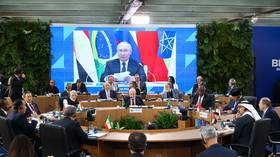
While key decisions are made in Brussels to further grow the euro area, Poland sends a clear signal about maintaining monetary independence. Minister for Finance Andrzej Domański He categorically cut off speculation about our country's accession to the Monetary Union, calling this debate "substitution debate". His declaration, made at the time Bulgaria received the green light for the adoption of the single currency, confirms that the government Donald Tusk it is not working on the introduction of the euro and is focusing on another economical priorities.
Green Light for Bulgaria: Euro region will grow by 21. Member
The event that revived the discussion on the future of the single currency in the countries of the European Union outside it was a decision concerning Bulgaria. European Commission Officially confirmed that Sofia had fulfilled all convergence criteria, i.e. a rigorous set of economical and legal conditions essential for the adoption of the euro. Following this recommendation, EU Finance Ministers agreed that Bulgaria should join the Monetary Union on January 1, 2026.
Bulgaria will thus become 21. associate State the euro area. This is simply a symbolic step, showing that, despite global crises, the single currency task remains attractive to countries seeking deeper economical and political integration with the core of the Union. This decision naturally pointed to another countries outside the monetary union, including Poland.
Clear Position of Poland: ‘Substitution discussion’ and Growth Priority
In consequence to questions and comparisons to the Bulgarian situation, Minister of Finance Andrzej Domański presented the clear and firm position of the Polish government. He stressed that the government is not conducting any work on Poland's accession to the euro area, and that the current economical situation of our country is diametrically different from Bulgarian.
In his opinion, maintaining the gold is at this phase optimal solution for the Polish economy. Furthermore, the head of the finance department called the public debate on the euro "a replacement debate", suggesting that it diverts attention from real and more urgent challenges. As he stated, the government focuses its efforts on stimulating economical growth and attracting investment alternatively than on the changeover process. The key argument is that Poland for this minute does not meet the formal convergence requirements.
Criteria from Maastricht: Why Poland (Still) Is Not Ready?
The declaration of Minister Domański has a solid basis in nonsubjective economical indicators. In order to adopt the euro, the candidate country must meet the alleged Maastricht criteria to warrant economical and financial stableness after entering the monetary union. The main conditions are:
- Price stability: Inflation in a candidate country must not exceed by more than 1.5 percent points the average inflation rate in the 3 EU associate States with the lowest inflation. Poland has been facing increased inflation for a long time, which is well above this threshold.
- Stability of public finances: The budget deficit must not exceed 3% of GDP and public debt must not exceed 60% of GDP. Although Poland is on the debt threshold, the issue of deficits is problematic, especially in periods of increased social spending or investment.
- Exchange rate stability: The country must participate in the alleged Monetary Courses mechanics (ERM II) for at least 2 years, maintaining a unchangeable exchange rate of its currency vis-à-vis the euro without strong fluctuations. Poland has never joined ERM II.
- Long-term interest rate stability: Long-term interest rates must not be higher by more than 2 percent points than the average in the 3 EU countries with the lowest inflation.
According to economical analyses, Poland does not yet meet most of these conditions, which makes the discussion of fast accession to the euro area purely theoretical.
Analytical Comment: Monetary sovereignty versus Deeper Integration
The government's decision to postpone plans to adopt the euro for an indefinite future is part of a multi-annual debate on the benefits and costs of own currency. Maintaining gold gives Poland a key tool in the form of A sovereign monetary policy. The National Bank of Poland can set interest rates by itself, reacting to the current economical situation – raising them to fight inflation or lowering them to stimulate growth during the slowdown. The liquid gold exchange rate besides acts as a natural "shock shock absorber" – in the event of a crisis, a weaker currency can increase export competitiveness and aid the economy to return to growth.
On the another hand, giving up the euro means continuing to bear transaction costs and exchange rate risks by entrepreneurs, especially those trading with euro area countries. Supporters of the single currency besides item the political benefits – entry into the European Union's "core", greater impact on economical decisions taken in Frankfurt and Brussels and symbolic confirmation of full integration with the community.
The Declaration by Minister Domański shows that, in the current situation, the government assesses the benefits of having gold as outweighing possible gains from entering the euro area.
Outsider Club: Who else remains outside the Euro Zone?
Poland is not alone in its decision. respective another associate States of the European Union stay outside the euro area. These are Denmark, Sweden, Czech Republic, Hungary and Romania. Each of these countries has its reasons not to accept the single currency. Denmark, for example, has negotiated in the Maastricht Treaty a peculiar exception (the alleged opt-out), which exempts it from the work to introduce the euro. Sweden, despite its formal commitment, intentionally fails to meet the criterion of exchange rate stability, reflecting the negative attitude of the public expressed in the referendum. The another countries, like Poland, do not yet meet all the convergence criteria or recognise that this is not the best time for them to change their currency.
The Declaration by the Minister of Domański so closes the debate on the euro in Poland for the close future, and gold remains a key instrument of national economical policy.
Read more:
New information on the adoption of EURO by Poland. End of doubt


















